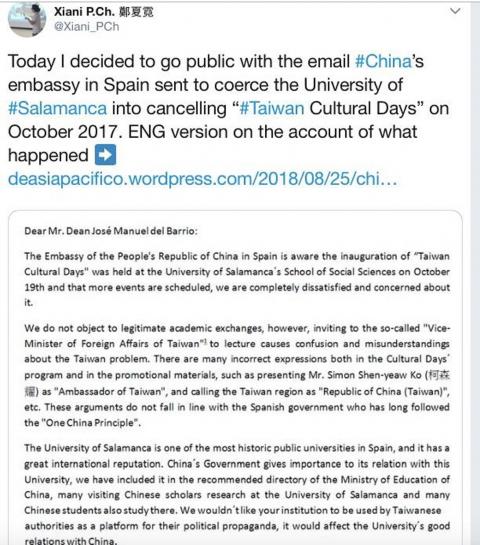Beijing’s behavior was “out of control,” the Ministry of Foreign Affairs (MOFA) said yesterday after a Taiwanese-Spanish academic said that China’s embassy in Spain pressured the University of Salamanca to cancel a Taiwanese culture event.
“Today I decided to go public with the email #China’s embassy in Spain sent to coerce the University of #Salamanca into cancelling “#Taiwan Cultural Days” on October 2017,” Shiany Perez-Cheng (鄭夏霓) tweeted late on Saturday.
Perez-Chen is a professor of international relations at the university and a leading organizer of the university’s Taiwan Culture Day.

Photo from Shiany Perez-Cheng’s Twitter account
A letter attached to the tweet that Perez-Chen said was an English-language version of the embassy’s e-mail said: “Inviting to [sic] the so-called ‘Vice Minister of Foreign Affairs of Taiwan’ to lecture causes confusion and misunderstanding about the Taiwan problem.”
“There are many incorrect expressions in the cultural days’ program and in the promotional materials,” it said. “Those arguments do not fall in line with the Spanish government, who has long followed the ‘one China principle.’”
“We wouldn’t like your institution to be used by Taiwanese authorities as a platform for its political agenda, it would affect the university’s good relations with China,” it said.
The letter demanded that the university accept the “one China” principle and take measures to “avoid and eliminate the adverse effects.”
The defilement of a storied European university is the latest instance of China’s continued persecution of Taiwan, the ministry said in a statement.
Beijing’s hinderance of Taiwanese participation in free academic and cultural exchanges is “barbaric,” the ministry said, adding that the government was dismayed and angered.
Beijing’s all-out effort to squeeze Taiwan’s international space, instead of achieving “the union of souls across the [Taiwan] Strait” touted by Chinese President Xi Jinping (習近平) in March, would serve only to invite the “anger and even scorn for China of the Taiwanese,” the ministry said.

AGING: As of last month, people aged 65 or older accounted for 20.06 percent of the total population and the number of couples who got married fell by 18,685 from 2024 Taiwan has surpassed South Korea as the country least willing to have children, with an annual crude birthrate of 4.62 per 1,000 people, Ministry of the Interior data showed yesterday. The nation was previously ranked the second-lowest country in terms of total fertility rate, or the average number of children a woman has in her lifetime. However, South Korea’s fertility rate began to recover from 2023, with total fertility rate rising from 0.72 and estimated to reach 0.82 to 0.85 by last year, and the crude birthrate projected at 6.7 per 1,000 people. Japan’s crude birthrate was projected to fall below six,

US President Donald Trump in an interview with the New York Times published on Thursday said that “it’s up to” Chinese President Xi Jinping (習近平) what China does on Taiwan, but that he would be “very unhappy” with a change in the “status quo.” “He [Xi] considers it to be a part of China, and that’s up to him what he’s going to be doing, but I’ve expressed to him that I would be very unhappy if he did that, and I don’t think he’ll do that. I hope he doesn’t do that,” Trump said. Trump made the comments in the context

SELF-DEFENSE: Tokyo has accelerated its spending goal and its defense minister said the nation needs to discuss whether it should develop nuclear-powered submarines China is ramping up objections to what it sees as Japan’s desire to acquire nuclear weapons, despite Tokyo’s longstanding renunciation of such arms, deepening another fissure in the two neighbors’ increasingly tense ties. In what appears to be a concerted effort, China’s foreign and defense ministries issued statements on Thursday condemning alleged remilitarism efforts by Tokyo. The remarks came as two of the country’s top think tanks jointly issued a 29-page report framing actions by “right-wing forces” in Japan as posing a “serious threat” to world peace. While that report did not define “right-wing forces,” the Chinese Ministry of Foreign Affairs was

PREPAREDNESS: Given the difficulty of importing ammunition during wartime, the Ministry of National Defense said it would prioritize ‘coproduction’ partnerships A newly formed unit of the Marine Corps tasked with land-based security operations has recently replaced its aging, domestically produced rifles with more advanced, US-made M4A1 rifles, a source said yesterday. The unnamed source familiar with the matter said the First Security Battalion of the Marine Corps’ Air Defense and Base Guard Group has replaced its older T65K2 rifles, which have been in service since the late 1980s, with the newly received M4A1s. The source did not say exactly when the upgrade took place or how many M4A1s were issued to the battalion. The confirmation came after Chinese-language media reported